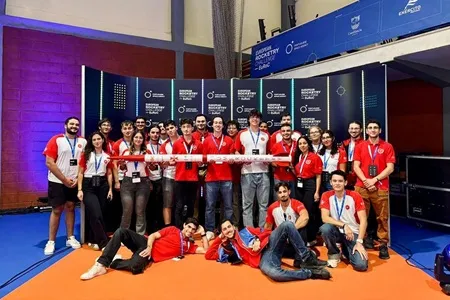-
 Welcome to plumtriA platform for Research & Innovation
Welcome to plumtriA platform for Research & Innovation -
 Looking for Funding?Check out the current open calls
Looking for Funding?Check out the current open calls -
 Register today to start receiving our monthly newsletter
Register today to start receiving our monthly newsletter -
 Looking to partner up?Search our list of registered profiles
Looking to partner up?Search our list of registered profiles -
 You have questions on a particular funding programme?
You have questions on a particular funding programme?
University of Malta Rocketry Team makes Top 10 Despite Motor Disaster
Image

The University of Malta’s Rocketry team is the first Maltese team to enrol in the European Rocketry Challenge (EuRoC). The competition, held in Portugal, hosted 29 teams, drawn from universities across Europe.
Their challenge is to launch their rocket to three or nine kilometres, depending on the category.
Led by co-founder Ryan Grech, Malta’s team spent about six months getting the completely student-made rocket ready for the competition.
Being the team’s first attempt at this competition, they were up against heavyweight teams established decades ago with budgets amounting to over €100,000.
The Maltese team had to compete as novices with a conservative budget of €4,000, the smallest budget of all the teams.
The day before they were supposed to head off for the competition, the team carried out a static fire test on the rocket motor to evaluate its performance before the competition. Things did not go to plan, and the team experienced a catastrophic failure at launch.
“In other words, the entire motor exploded and the case launched approximately 250 metres in the air,” Grech said.
The team then contemplated calling off the trip, but they chose to go anyway and attempt to build a new motor. This meant that, in the space of two days, they had to source parts in a foreign country, design a new motor and build it.
“We decided to split into three teams to make this work. A few people got into the van we rented and drove around different villages and eventually to Lisbon to source parts. A few others were tasked with speaking to other teams and asking for help. While around 20 of us remained at the Airbnb designing a new engine,” he said.
Through sheer determination, help from other teams and a bit of luck, the team were able to build a new motor.
“The officials approved it [for a static fire test] but gave the motor a 10 per cent chance of success,” he said, adding they only had enough time and resources to carry out a static launch test.
‘We thought it exploded again’
The time to carry out the static fire test arrived and the motor was set up in a concrete test stand to hold it in place.
The team stood at a safe distance, and as the launch began, the motor took off and “punched through 300kg of concrete”.
“We saw the motor fly out of the stand and land about 600 metres away. We thought it exploded again,” Grech said.
Despite their concerns, the motor appeared to be still intact. It was the stand that failed.
“It passed the review, so we could theoretically have launched the rocket. Unfortunately, we did not have enough time or resources. The motor was only single-use,” he said.
Malta’s team placed eighth out of 29 for the team award.
This project was supported by Xjenza Malta.
Information and image source:

plumtri is a platform that facilitates networking and knowledge sharing amongst stakeholders in the Mediterranean, involved in the spheres of research and innovation and serves as a 'one-stop-shop' for information on relevant funding opportunities and events.
Contact Us
Address:
Xjenza Malta
Villa Bighi,
Dawret Fra Giovanni Bichi,
Kalkara KKR 1320,
Malta.
(+356) 2360 2161



